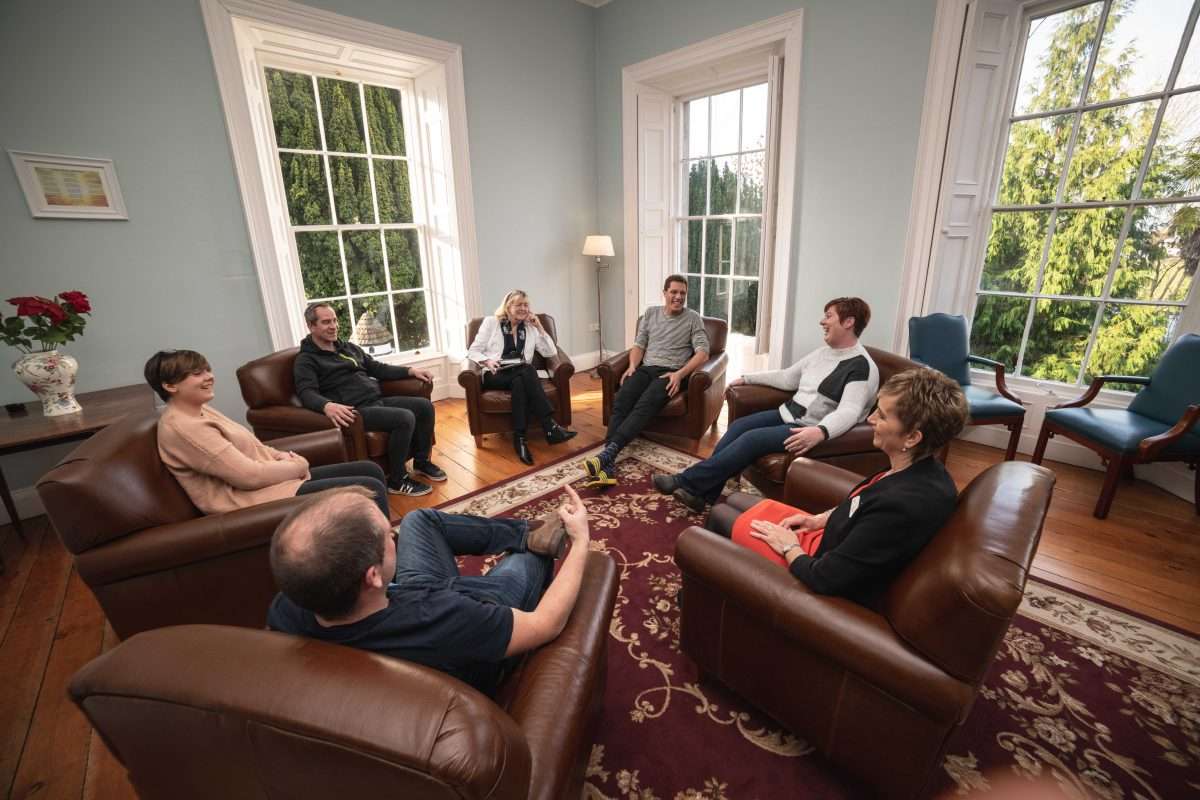
Rediscover Who You Are
Entering an alcohol and drug treatment program requires courage and means you are a step closer to finding long-term freedom from addiction. However, many often experience fear, not only about getting clean and/or sober but of the therapeutic process and the prospect of being honest with yourself and others.
Group therapy is one of the most prevalent elements of addiction treatment. While individual and group therapy are both designed to help individuals find freedom from addiction, group therapy has many unique benefits that complement individual therapy.
What Is Group Therapy?
Group therapy originated in the early 20th century, with an American physician named Dr J. H. Pratt. Pratt held group sessions for patients with tuberculosis and found that his sessions gave them a much-needed sense of community, a supportive environment, and a feeling of identification with others who were going through the same thing. Over the course of the 20th century, group therapy grew in popularity.
Group therapy is a form of psychotherapy that involves one or more mental health practitioners who deliver psychotherapy to several individuals in each session. Group therapy enhances self-awareness, self-expression, and insight through the shared experiences and openness of other group members.
Group therapy aims to help people manage mental health conditions or cope with negative experiences and behaviours. In the case of addiction, group therapy sessions provide support, encouragement and sometimes healthy challenge to overcome denial, a key feature of addiction.
How Group Therapy Works in Rehab
At Smarmore Castle, group sessions are a key feature of our addiction treatment programme, led by a therapist twice a day. Clients work together, confront one another, empathise, support, and, over time, witness positive changes in the group members.
One of our therapists will listen, confront and highlight issues and problems, reflecting these back to the patient – this is a gentle process and not intended to embarrass individuals; rather, show other points of view. Group therapy does not try to find causes for dependency, but rather takes a practical ‘here and now’ look at a patient’s addiction(s).
Patients present their life stories, complete small tasks and present homework e.g. examining some of the most serious consequences of their addiction and sharing during group therapy and identifying how fear/shame can block recovery. This begins a journey for patients which, with additional insights from the group members, enables them to deepen their understanding of addiction.
Topics that are addressed include:
- shame and guilt over substance misuse
- unhelpful relationships and/or scenarios that could lead to relapse
- substance misuse behaviour and consequences
- decision-making skills that are crucial to recovery
- long-term abstinence and a commitment to Alcoholics Anonymous (AA), Narcotics Anonymous (NA) or Gamblers Anonymous (GA)
- spirituality and philosophy
Types of Group Therapy
At Smarmore Castle, there are different types of group therapy, in addition to regular process groups, that might be included in a personalised treatment plan. Groups recommended to clients will depend on their specific needs.
Relapse Prevention Group
Specific relapse prevention groups maximise insight into addiction and identify triggers that could cause patients to relapse once they leave rehab. Using a range of evidence-based addiction therapies and group work targets any underlying factors that have contributed to someone’s addiction, making sure all issues from their past and present are addressed, preventing relapse.

Reaching Out
Eating Disorders Group Therapy
Group therapy is an excellent source of support for those with eating disorders. The benefits of eating disorders group therapy include eating disorder education, defence against isolation, peer support, and compassionate confrontation of unhealthy behaviours. Eating disorder-specific groups are helpful when someone is being treated for an eating disorder in a facility that caters to addictions and other behavioural health concerns, as those recovering from eating disorders have needs and behaviours to change that are specific to food disorders.
Body Image Group Therapy
Body image group therapy is a space for those struggling with self-esteem as related to body image to unpack their feelings in a safe and supportive environment. The group setting is an excellent forum to unpick beauty standards, the subliminal messages we receive from diet culture about self-worth, and the mortality of food (food being good or bad/clean or unclean). How cultural, familial, and social factors contribute to poor body image may also be explored.
Adult Children of Alcoholics Group
Adult Children of Alcoholics is a support group for those who suffered from emotional damage due to alcoholic or dysfunctional parents. It is also recommended that those who experienced this in their childhood have specific therapy sessions on this issue.
Women’s Group Therapy
Adult women of all ages are brought together in a therapeutic community to provide a safe and supportive space to share their feelings. We know that many women feel more comfortable in single-sex groups, the issues that can affect women almost exclusively. Women’s group therapy and led by female addiction therapists.

Personalised Treatment
Specialised Group Therapy
Some groups are directed towards a particular goal, for example, cognitive behavioural therapy, gambling therapy, and relapse prevention therapy. The full range of specialised group therapies is shown on arrival and patients are encouraged to participate in as many as possible, as relevant to their personalised care plan.
Group Therapy vs Support Groups
While each group offers a different kind of support, group therapy and support groups share some characteristics. They both bring together people who are dealing with similar mental and behavioural concerns, create space to explore feelings in a group setting, help to improve a sense of self and self-awareness, and end isolation. However, there are key differences between group therapy and support groups.
How the Group Is Facilitated
Group therapy is led by a professionally qualified therapist who acts as a facilitator, guiding group discussions, activities, and psychological exercises. Support groups are generally run by those who have experienced and found freedom from mental or behavioural health issues. Support groups offer a space for people who have or are sharing similar experiences or struggles to connect, providing each other with support.

Contact Us Today
Group Objectives
Group therapy and support groups differ in their primary purpose. Support groups are typically based on helping people cope with a specific issue such as addiction, bereavement, or health issues. Group therapy focuses on helping group members better understand both their thoughts and behaviours, how to change them, and then actualise these changes.
Group Focus
Support groups usually focus on a commonly shared problem such as the use of drugs or alcohol and attendees are there to get support for this particular issue. In group therapy, the experiences of individuals can vary from issues with anxiety and depression to eating disorders and post-traumatic stress disorder. Group therapy can be applied to several approaches to help with a number of concerns.
Time Commitment
Generally, you are welcome to join and leave support groups at any time and make no commitment to attend. However, regular attendance is usually encouraged as this can be beneficial for both you and the group. Group therapy often requires a commitment in terms of attendance for the whole of a group therapy session and the number of sessions. This is asked of group members as missing a session can be disruptive to the group and affect your recovery.
Cost
Support groups such as Alcoholics Anonymous and Narcotics Anonymous (as well as other 12-step groups) are free to attend. You may also be able to receive free or subsidised group support via a health service or charity. Group therapy is commonly a service that is paid for or is part of a private rehabilitation treatment programme.

Download our Brochure
How to Get the Most Out of Group Therapy
If you are thinking about starting group therapy or are preparing to enter an addiction treatment programme, you might feel unsure about how to navigate or get the most out of the experience. This is normal but here are some suggestions to help you get the most out of group therapy.
Honesty
To begin with, honesty can feel difficult, even frightening. Start by identifying what your thoughts and feelings are, and then practice sharing them, ideally as they arise, during group therapy. Group therapy is a safe space to say when you are feeling scared, frustrated, bored, excited, angry, sad, happy, or merely that you are unsure of what you’re feeling.
Feedback
The power of group therapy is that you are in a position to receive feedback from a number of people instead of just one therapist. This is an effective way to start to understand how your behaviour may affect others, know you are not alone, break down the walls of denial, and overcome worries about how you are seen by others.
Contact Us Today
Start Your Recovery Journey with Smarmore Castle Clinic
Engage With the Group
The beauty of group therapy is that it is a safe space, without the perceived risks of honest interactions outside of the group context, to challenge each other. This might be when you: notice denial or defensiveness in someone; disagree with someone’s point of view or see something from a different perspective; or when think someone is isolating or not contributing.
Practice New Behaviour
The group is a safe space to practice different ways of interacting with people. How much you receive could look like saying things in group therapy that you might not feel able to say outside of the group setting with friends and family.
Benefits of Group Therapy
Group therapy offers a direct antidote to isolation, which is a key feature of mental illness and addiction. In group therapy, it is possible for people to find their authentic voice and reclaim a sense of self as well as discover a peer group that is supportive and nonexploitive. These are crucial features of psychological and interpersonal growth.